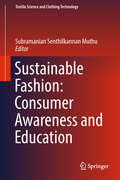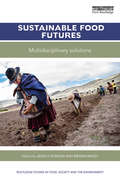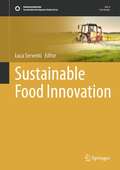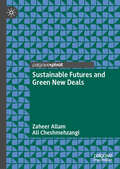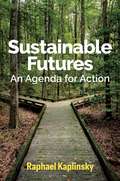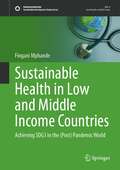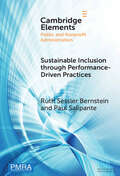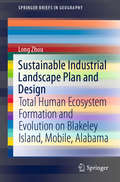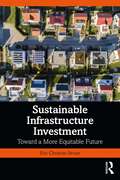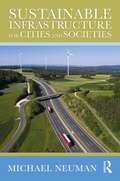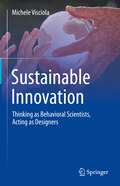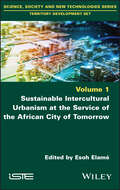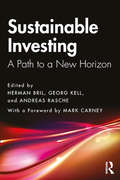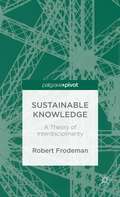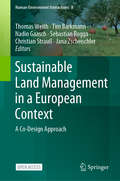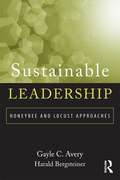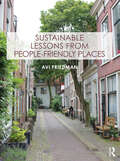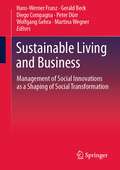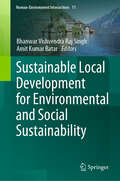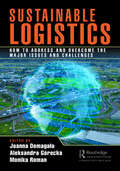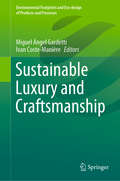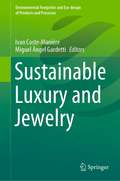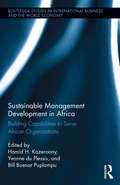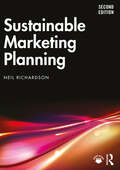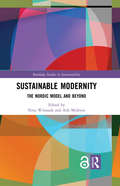- Table View
- List View
Sustainable Fashion: Consumer Awareness and Education (Textile Science and Clothing Technology)
by Subramanian Senthilkannan MuthuThis book uses case studies to discuss consumer awareness of and education on sustainable fashion. It highlights how some textile brands have started using consumer awareness tags to educate consumers on the use of their products (e.g. which machine cycle and temperature they should use to wash their products, as well as the best drying conditions in terms of environmental sustainability). Consumer awareness of and knowledge on sustainable fashion is the crux of customer-centric sustainability, and several NGOs and even brands have started taking essential steps to promote this.
Sustainable Food Futures: Multidisciplinary Solutions (Routledge Studies in Food, Society and the Environment)
by Jessica Duncan Megan BaileySecuring sustainable food for everyone is one of the world's most pressing challenges, but research, policy, and programmes remain fragmented, and effective solutions have been slow to emerge. This book takes on these challenges by proposing a range of solutions that can advance pathways towards sustainable food futures. Complete with recipes, this book is structured so that readers are taken in a logical progression through discussions of solutions, highlighting the need to recognise the importance of place and the importance of participation, and to challenge dominant descriptions of markets, through to re-designing food systems. The solutions presented in this book are based on real-world cases, but discussions remain deliberately broad to encourage thinking in new ways. Cases are drawn from Africa, Asia, Europe, and North and South America. The book is of relevance to those interested in sustainable food futures, and can serve as a supplementary textbook for a wide range of courses in food studies and related disciplines.
Sustainable Food Innovation (Sustainable Development Goals Series)
by Luca ServentiThis text offers a holistic approach to the two topics of the highest interest in the current and future food industry: sustainability and nutrition. The current knowledge is narrow and specific to individual topics focusing on either one nutrient or one discipline. Food is part of a wide circle of disciplines: nutrition, technology, sensory, environmental aspects, psychology, economy, culture and society. In the recent years, the sales of innovative foods such as meatless burgers, allergen-free products and personalized nutrition have skyrocketed. Sustainable Food Innovation presents the big picture on each nutrient: industrial and natural sources (ingredients, food products), consumer acceptability (price, sensory quality) and nutritional properties (quantity and quality) with each chapter focusing on a specific essential nutrient. Further chapters illustrate the role of other elements of interest such as bioactive. In addition, experimental data is added to enrich the book. Online discussions on current food trends are analyzed and presented to the reader in the effort to understand consumers’ psychology. This will be the first publication to combine literature review and research data and the first to offer a comprehensive discussion on sustainable food innovation. The ultimate goal is to educate consumers and experts, providing technical and socioeconomic knowledge in a multidisciplinary context. Ultimately, informed technologists will develop healthier, sustainable food products and informed consumers will make informed decisions on nutrition and food choices.
Sustainable Futures and Green New Deals
by Ali Cheshmehzangi Zaheer AllamThis academic book critically examines the concept of sustainable futures and its interdependence with the policy framework of Green New Deals. We emphasize the inherent link between the two concepts by highlighting how Green New Deals can pave the way for a sustainable and just future in key areas such as environmental policy, economic development, and social equity. Taking a multidisciplinary approach, the book draws on insights from fields such as environmental studies, sustainable development, political ecology, and climate policy to explore the intricacies of these interconnections. The revised description underscores the importance of understanding the Green New Deal's historical and political contexts, as well as its implications for sustainable futures. The book delves into the theoretical perspectives that shape our comprehension of sustainable futures, the diverse strategies employed by countries and regions in implementing Green New Deals, the role of technological innovation and social movements in fostering sustainable transitions, and the political dynamics surrounding the Green New Deal. Through an analysis of the Green New Deal's role in sustainable development, climate policy, and environmental justice, the book provides a necessary and timely contribution to ongoing debates. The chapters offer detailed explorations of the interrelationships between these key areas, emphasizing how the Green New Deal can serve as a transformative policy framework for achieving sustainable and equitable futures. "Sustainable Futures and Green New Deals" is intended for scholars, policymakers, activists, and students interested in understanding the complex and interconnected issues surrounding sustainable development, climate policy, and environmental justice.
Sustainable Futures: An Agenda for Action
by Raphael KaplinskyLong before the pandemic, economies across the world were in trouble, with growth slowing across the board. This downturn coincided with growing inequality and social exclusion. Rising political dissatisfaction with ruling elites fuelled the rise of populism. Add to this the alarming environmental emergency and few can deny we live in a time of multiple sustainability crises. While this conclusion can lead to despair, in this broad-ranging book Raphael Kaplinsky, a leading development policy analyst, argues that the future is not necessarily bleak. Interrogating the causes and nature of the systemic crises we are living through, he shows how the challenges which we now face mirror previous historical epochs, in which dominant ‘techno-economic’ paradigms flourish, mature and run into crisis. In each case, decisive action is required to move to a more economically and socially sustainable world. In our time, we are witnessing the exhaustion of the Mass Production paradigm. How we herald and manage the transition to the next paradigm – that of Information and Communications Technologies – will determine our capacity to build a more prosperous, equitable and environmentally sustainable world. This book sets out an integrated agenda for action by multiple stakeholders to achieve this end.
Sustainable Health in Low and Middle Income Countries: Achieving SDG3 in the (Post) Pandemic World (Sustainable Development Goals Series)
by Fingani MphandeThis book highlights lessons from the COVID-19 pandemic and explains how these can be used to build sustainable health systems, especially in Low- and Middle-Income Countries (LMIC). It investigates the impact of outbreak response and management on health sustainability in LMIC from the perspective of SDG3: “Ensuring healthy lives and wellbeing for all at all ages”. Despite strides being made in some areas for SDG target 3.3 to fight communicable diseases, the COVID-19 pandemic has caused interruptions that will considerably affect vaccination coverage as well as the progress that was made, for example: in reducing malaria cases. Vulnerable populations who were already struggling to access their healthcare needs before the pandemic may face even greater challenges at present and in the years to come, post-pandemic. This book considers the progress on attaining the SDG3 targets, specifically: to improve early warning systems for management of national and global health risks, and the effect of pandemics - including but not limited to the COVID-19 pandemic - and emerging disease outbreaks. It explores the weaknesses and strengths in LMIC and how to strengthen capacities in these countries. The author also investigates and proposes approaches that can, or should, be implemented to ensure sustainable health systems in developing countries, including early warning systems, risk reduction, and the management of global and national health risks. This book is of great interest to public health professionals, infectious diseases experts, and epidemiologists, as well as students and researchers of public health systems and healthcare infrastructure in developing countries.
Sustainable Inclusion through Performance-Driven Practices: An Evidence-Based, Dynamic Systems Framework (Elements in Public and Nonprofit Administration)
by Ruth Sessler Bernstein Paul SalipanteHow can organizations better achieve inclusion, equity, and superior performance from diversity? Decades of stalled progress require a wider range of policies. Applying a system thinking approach to a transdisciplinary synthesis of research findings, the authors' comprehensive framework guides inquiry and practice by identifying problematic dynamics. Comparative case studies reveal, in contrast, favorable dynamics of intergroup contact that result from an evolved elaboration of practices for inclusive interactions, socialization, and accountability. Over time, when promoted for mission attainment, applied to all members, and customized to the workgroup, the practices generate inclusion, equity, and superior performance.
Sustainable Industrial Landscape Plan and Design: Total Human Ecosystem Formation and Evolution on Blakeley Island, Mobile, Alabama (SpringerBriefs in Geography)
by Long ZhouThis book applies the Total Human Ecosystem as a guiding concept in coastal urban communities to achieve a mutually beneficial relationship between industrial parks and their surrounding wetlands. The early 21st century has been shaped by a need for economic recovery, and by climate change. Consequently, new development models that promote both economic growth and environmental preservation are urgently needed. In turn, the book puts forward an innovative proposal to achieve the shift from a hard path to a soft path through landscape architectural interventions, one that will help industrial factories and their surrounding wetlands coevolve toward sustainability. Through the incorporation of science and design, the proposal for the Total Human Ecosystem on Blakeley Island integrates industry with its surrounding environment. The design scenarios for this new living system are based on scientific principles of landscape ecology that take into account both the human and nonhuman environments as components of the land mosaic. Sustainability is not a final status that is achieved once and for all; it is an ongoing challenge. As a case study, this proposal outlines the urgently needed reconciliation between industrial parks and their surrounding natural ecosystems, and promotes the evolution of both components toward sustainability.
Sustainable Infrastructure Investment: Toward a More Equitable Future
by Eric Christian BruunThis book provides examples and suggestions for readers to understand how public investment decisions for sustainable infrastructure are made. Through detailed analysis of public investment in infrastructure over the last few decades in the United States, the United Kingdom, and Finland, the author explores how the decision-making processes for major public works spending, many of them requiring quite rigorous and detailed computational methodologies, can result in plans that underserve large portions of the population, are inequitable, and fail to efficiently preserve public property. Beginning with some of the commonly offered explanations for the slow pace of investment and repair in a supposedly prosperous society facing serious environmental challenges, the book then explores media’s role in shaping the public-at-large’s understanding of the situation and the unimaginative solutions put forward by politicians. It continues with some case studies of infrastructure investment, or lack thereof, including an exploration of competing uses for government funds. It concludes with some suggestions. It is aimed at a large readership of professionals, students, and policy makers in political science, urban planning, and civil engineering.
Sustainable Infrastructure for Cities and Societies
by Michael NeumanThe central role of infrastructure to cities, and in particular their sustainability, is essential for proper planning and design since most energy and materials are themselves consumed by or through infrastructures. Moreover, infrastructures of all types affect matters of economic and social equity, due to access that they provide or prevent. Sustainable Infrastructure for Cities and Societies shows how fundamental planning, design, finance, and governance principles can be adapted for sustainable infrastructure to provide solutions to make cities significantly more sustainable. By providing a contemporary overview on infrastructure, cities, planning, economies, and sustainability, the book addresses how to plan, design, finance, and manage infrastructure in ways that reduce consumption and harmful impacts while maintaining and improving life quality. It considers the interrelationships between the economic, political, societal, and institutional frameworks, providing an integrative approach including livability and sustainability, principles and practice, and planning and design. It further translates these approaches that professionals, policymakers, and leaders can use. This approach gives the book wide appeal for students, researchers, and practitioners hoping to build a more sustainable world.
Sustainable Innovation: Thinking as Behavioral Scientists, Acting as Designers
by Michele VisciolaThis book puts forward a new paradigm to understand and implement Sustainable Innovation (SI). Innovation without sustainability leaves out large swathes of the population or generates maladaptive or misappropriate behaviors. Innovative solutions will be sustainable if they can retain individual and group differences while offering greater benefits for the common good. When working together, designers, life, human and social behavioral scientists can add value, which promotes behavioral changes to the advantage of sustainable models in all fields. This volume presents a guide on how to set up sustainable innovation programs, as well as ideas on how to integrate multidisciplinary teams into innovation projects. Moreover, this book offers students a synthesis of non-academic thinking on the relationship between design and behavioral science.
Sustainable Intercultural Urbanism at the Service of the African City of Tomorrow
by Esoh ElaméMost African cities are human settlements that lack the systems needed for effective land use planning. In fact, the disorganization that prevails has become so complex that the concept of urbanism itself has been called into question. This book highlights the need to restore urban planning in African cities through sustainable development and interculturality. Furthermore, it addresses the balance of power between urban planning and sustainable development and explores the historical and postcolonial aspects of urban planning in African cities. A case study focusing on the development of sustainable cities and neighborhoods in the M’Zab Valley is also included, as well as topics such as urban greening, climatic threats and the problem of state agroindustrial land transactions, which compete with sustainable urban planning. Sustainable Intercultural Urbanism at the Service of the African City of Tomorrow is a valuable reference for researchers and practitioners interested in urban issues in African cities. These cities, in particular sub Saharan cities, have long been excluded from any discourse on sustainable cities and urban planning; this book places the focus on these cities and acknowledges their varied urban realities. The intention is to spark a new debate on sustainable urban planning in African cities based on intercultural sustainable urbanism, which is key to thinking about and building ecological, intercultural, compact, intelligent and postcolonial cities.
Sustainable Investing: A Path to a New Horizon
by Herman BrilThis book tells the story of how the convergence between corporate sustainability and sustainable investing is now becoming a major force driving systemic market changes. The idea and practice of corporate sustainability is no longer a niche movement. Investors are increasingly paying attention to sustainability factors in their analysis and decision-making, thus reinforcing market transformation. In this book, high-level practitioners and academic thought leaders, including contributions from John Ruggie, Fiona Reynolds, Johan Rockström, and Paul Polman, explain the forces behind these developments. The contributors highlight (a) that systemic market change is influenced by various contextual factors that impact how sustainable investing is perceived and practiced; (b) that the integration of ESG factors in investment decisions is impacting markets on a large scale and hence changes practices of major market players (e.g. pension funds); and (c) that technology and the increasing datafication of sustainability act as further accelerators of such change. The book goes beyond standard economic theory approaches to sustainable investing and emphasizes that capitalism founded on more real-world (complex) economics and cooperation can strengthen ESG integration. Aimed at both investment professionals and academics, this book gives the reader access to more practitioner-relevant information and it also discusses implementation issues. The reader will gain insights into how "mainstream" financial actors relate to sustainable investing.
Sustainable Knowledge: A Theory of Interdisciplinarity
by Robert FrodemanSustainable Knowledge rethinks the nature of interdisciplinary research and the place of philosophy and the humanities in society and offers a new account of what is at stake in talk about 'interdisciplinarity'.
Sustainable Land Management in a European Context: A Co-Design Approach (Human-Environment Interactions #8)
by Thomas Weith Tim Barkmann Nadin Gaasch Sebastian Rogga Christian Strauß Jana ZscheischlerThis open access book presents and discusses current issues and innovative solution approaches for land management in a European context. Manifold sustainability issues are closely interconnected with land use practices. Throughout the world, we face increasing conflict over the use of land as well as competition for land.Drawing on experience in sustainable land management gained from seven years of the FONA programme (Research for Sustainable Development, conducted under the auspices of the German Federal Ministry of Education and Research), the book stresses and highlights co-design processes within the “co-creation of knowledge”, involving collaboration in transdisciplinary research processes between academia and other stakeholders. The book begins with an overview of the current state of land use practices and the subsequent need to manage land resources more sustainably. New system solutions and governance approaches in sustainable land management are presented from a European perspective on land use. The volume also addresses how to use new modes of knowledge transfer between science and practice. New perspectives in sustainable land management and methods of combining knowledge and action are presented to a broad readership in land system sciences and environmental sciences, social sciences and geosciences.
Sustainable Leadership: Honeybee and Locust Approaches
by Gayle C. Avery Harald BergsteinerThe business case for operating along sustainable principles is becoming very clear. Sustainable organizations outperform their peers on many criteria, including corporate social responsibility, employee satisfaction and – surprising for some – even financially. Sustainable Leadership: Honeybee and Locust Approaches presents an evidence-based view of how 23 leadership practices facilitate outcomes that go beyond what is commonly referred to as the triple bottom line – environmental sustainability, corporate social responsibility and financial success. The book centers on a powerful metaphor of honeybee and locust behaviors, which illustrate two leadership philosophies with very different outcomes for a business and its viability. Gathering evidence from scholars combined with observations from successful firms around the world, the book presents a bundle of principles, behaviors and beliefs that forms a sustainable leadership system. This engaging, insightful book offers a set of principles that can be adapted in many ways to underpin sustainable leadership in different situations. It provides evidence and a rationale for building a business case to change towards more sustainable practices.
Sustainable Lessons from People-Friendly Places
by Avi FriedmanCurrent planning and design modes of cities are facing challenges of philosophy and form. Past approaches no longer sustain new demands and call for innovative thinking. In a world that is becoming highly urbanized, the need for a new outlook is propelled by fundamental global changes that touch upon environmental, economic and social aspects.The book introduces fundamental principles of timely sustainable urban design, paying attention to architecture, integration of natural features, public urban spaces and their successful use. Readers will learn how cities are transitioning to active mobility by placing the wellbeing of citizens at the heart of planning; making buildings fit nature; supporting local culture through preservation; and including community gardens in neighborhoods, among others. Written by a practicing architect, professor and author, the book is richly illustrated and features meticulously selected international case studies.
Sustainable Living and Business: Management of Social Innovations as a Shaping of Social Transformation
by Hans-Werner Franz Gerald Beck Diego Compagna Peter Dürr Wolfgang Gehra Martina WegnerThe title of the book derives from the theme of the 20th Conference on Applied Social Sciences of the Professional Association of German Sociologists, held in Munich in May 2019.The question of what concrete contributions social innovations can make to the transition to forms of sustainable coexistence and economic activity is as much the focus of this book as the question of what contribution the social sciences can make. Thus, on the one hand, it is about concrete social innovations that help us to achieve the goal of living and doing business sustainably, but on the other hand, it is also about the way in which the social sciences - not least through appropriate theoretical and methodological training - can be made socially responsible for the success of such socially innovative processes.This book is a translation of an original German edition. The translation was done with the help of artificial intelligence (machine translation by the service DeepL.com). A subsequent human revision was done primarily in terms of content, so that the book will read stylistically differently from a conventional translation.
Sustainable Local Development for Environmental and Social Sustainability (Human-Environment Interactions #11)
by Bhanwar Vishvendra Raj Singh Amit Kumar BatarThe world organizations, including national governments, have already recognized the importance of the Aichi Biodiversity Target, the Paris Agreement, Sustainable Development Goals (SDGs), Ecosystem-based Disaster Risk Reduction (Eco-DRR), Low Carbon Society. Therefore, there is an urgent need to act locally to tackle socio-economic, socio-ecological, socio-hydrological, and environmental conservation concerns in changing environments on a local to global scale and need to promote scientific solutions and common knowledge to achieve harmony between nature and humans under the threat of global climate change and the post-Covid-19 pandemic situation. For this purpose, the SLD approach is needed towards environmental and social sustainability. However, the SLD approach is challenging in terms of supply and demand of natural resources, resource depletion, socio-economic inequality, biodiversity loss, and climate change risk from local to the global scale, which vary based on different socio-economic, political, geographical, and cultural factors. Therefore, this book will highlight the environmental and social sustainability research by taking the local/regional case study. This book would also highlights the importance of policy interface at a local to global scale for environmental and social sustainability (ESS) in changing environments.
Sustainable Logistics: How to Address and Overcome the Major Issues and Challenges
by Joanna Domagała Aleksandra Górecka Monika RomanLogistics refers to the processes that start with resources and their acquisition, storage, and transportation to their destination. The concept is crucial in business -- particularly for the manufacturing sector -- to understand, manage, and control how resources are handled and progress through the whole supply chain. Now, there is a strong trend to focus on sustainability and eco-friendly solutions in logistics. Processes based on both technology and management need innovations and detailed implementation steps to achieve a satisfactory level of sustainability. This book explores how and where innovations can be implemented to provide a wide approach to sustainability in logistics. It addresses the main challenges affecting modern and sustainable logistics and supply chains and is organized according to six main themes: supply chain management; information intelligent hubs (e.g. warehouse and cities); sustainable transportation; technology for logistics; reverse logistics; and city logistics. The key results presented are based on both extensive types of research and business cases. The overarching advanced logistics and supply chain concepts at the heart of this book contribute to a sustainable intelligent logistics and transport system by making it more efficient, reliable, environmentally friendly, and competitive. Essentially, this book presents the most current research related to sustainability in logistics activities and addresses the theoretical background of sustainability and its significance for logistics, the challenges in supply chains and transportation, and possible solutions for more sustainable logistics systems.
Sustainable Luxury and Craftsmanship (Environmental Footprints and Eco-design of Products and Processes)
by Ivan Coste-Manière Miguel Ángel GardettiThis book explores the intricate relationship between luxury and craftsmanship, using brand-based case studies and consumer behavior to do so. In addition to revealing how the artification of luxury affects consumer behavior with branding and traditions, it discusses how sustainable luxury could not only offer a vehicle for more respect for the environment and social development, but could also be a metaphor for the cultures, art traditions, and innovations of various nationalities, continuing the legacy of local craftsmanship.
Sustainable Luxury and Jewelry (Environmental Footprints and Eco-design of Products and Processes)
by Ivan Coste-Manière Miguel Ángel GardettiThis book discusses the current trends in luxury and jewelry and presents how to make these sustainable for a better future. In the age of sustainability, we increasingly see how designers and consumers begin to think beyond a product's look&feel and operation, and are especially concerned about what has happened during its manufacturing process and what will happen once its useful life comes to an end. Today, consumers value that every industrial product and process should be sustainable, beneficial for the people, the economy and the planet, and so is the case for jewelry.
Sustainable Management Development in Africa: Building Capabilities to Serve African Organizations (Routledge Studies in International Business and the World Economy)
by Hamid KazeroonySustainable Management Development in Africa examines how African management and business scholarship can serve African and multinational management and organizations operating in Africa. In a broader sense, this book, within an African context, explores how human capital and intellectual capabilities can be organized at the higher education level; describes the cultural, social, and political influencers impacting management and organization; helps conceptualize African management theories to address organizational effectiveness; addresses the current management and organizational practices in Africa in identifying challenges; and provides guidance for more effective management and organizational operation. Aimed at researchers, academics, and advanced students alike, this book lays the groundwork for the application of uniquely African theoretical and practical perspectives for sustainable management and organizational operation, as explained from a contemporary African point of view. In addition and most important, this book contains a uniquely African content that allows for developing new theories and examining new ways of doing business, thus reaffirming the rise of African scholarship in the fields of management, organization, and business.
Sustainable Marketing Planning
by Neil RichardsonThis book provides practical insights, tools and frameworks to help readers produce tactically and strategically appropriate marketing plans.Showing how to embed sustainability in these plans, students will be shown how to implement changes while being encouraged to reflect on why they are needed. The text reflects on contemporary themes that impact on sustainable marketing planning, including consumer behaviour, entrepreneurialism, internal marketing, services, international marketing, event management and digital marketing. The second edition has been fully updated with a greater focus on the issues surrounding sustainability, including the environmental challenges facing businesses, sustainable accreditation and integrating the UN SDGs. It provides background on the value discourses that underpin sustainability, incorporates new examples and case studies from broader regions around the world and introduces TBL-based loyalty. Full of tools and frameworks to improve comprehension, including chapter-by-chapter learning outcomes, summaries, exercises, applied activities and mini case studies, it bridges the gap between theory and practice effectively and accessibly.Presenting contemporary themes and challenges at the cutting edge of business research and practice, this book provides core reading for advanced undergraduate and postgraduate students of sustainable marketing, marketing planning and marketing strategy, as well as professionals seeking to improve the competitive advantage of their organisations.Online resources for the use of instructors include PowerPoint lecture slides and a multiple choice questions section.
Sustainable Modernity: The Nordic Model and Beyond (Routledge Studies in Sustainability)
by Nina Witoszek Atle MidttunThe Open Access version of this book, available at https://www.taylorfrancis.com/books/e/9781351765633, has been made available under a Creative Commons Attribution-Non Commercial-No Derivatives 4.0 license. In the 21st century, Norway, Denmark and Sweden remain the icons of fair societies, with high economic productivity and quality of life. But they are also an enigma in a cultural-evolutionary sense: though by no means following the same socio-economic formula, they are all cases of a "non-hubristic", socially sustainable modernity that puzzles outside observers. Using Nordic welfare states as its laboratory, Sustainable Modernity combines evolutionary and socio-cultural perspectives to illuminate the mainsprings of what the authors call the "well-being society". The main contention is that the Nordic uniqueness is not merely the outcome of one particular set of historical institutional or political arrangements, or sheer historical luck; rather, the high welfare creation inherent in the Nordic model has been predicated on a long and durable tradition of social cooperation, which has interacted with global competitive forces. Hence the socially sustainable Nordic modernity should be approached as an integrated and tightly orchestrated ecosystem based on a complex interplay of cooperative and competitive strategies within and across several domains: normative-cultural, socio-political and redistributive. The key question is: Can the Nordic countries uphold the balance of competition and cooperation and reproduce their resilience in the age of globalization, cultural collisions, the digital economy, the fragmentation of the work/life division, and often intrusive EU regulation? With contributors providing insights from the humanities, the social sciences and evolutionary science, this book will be of great interest to students and scholars of political science, sociology, history, institutional economics, Nordic studies and human evolution studies.
